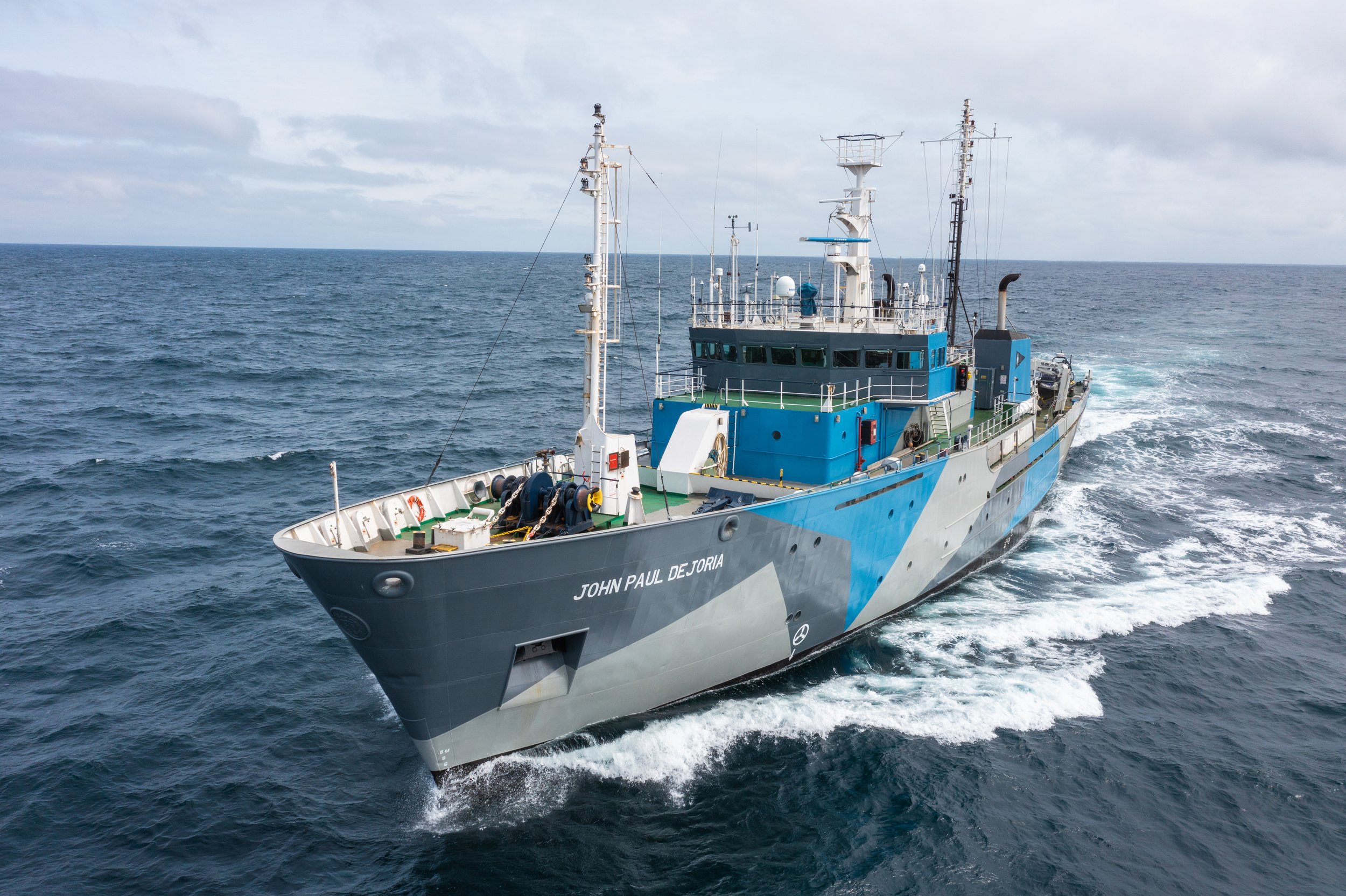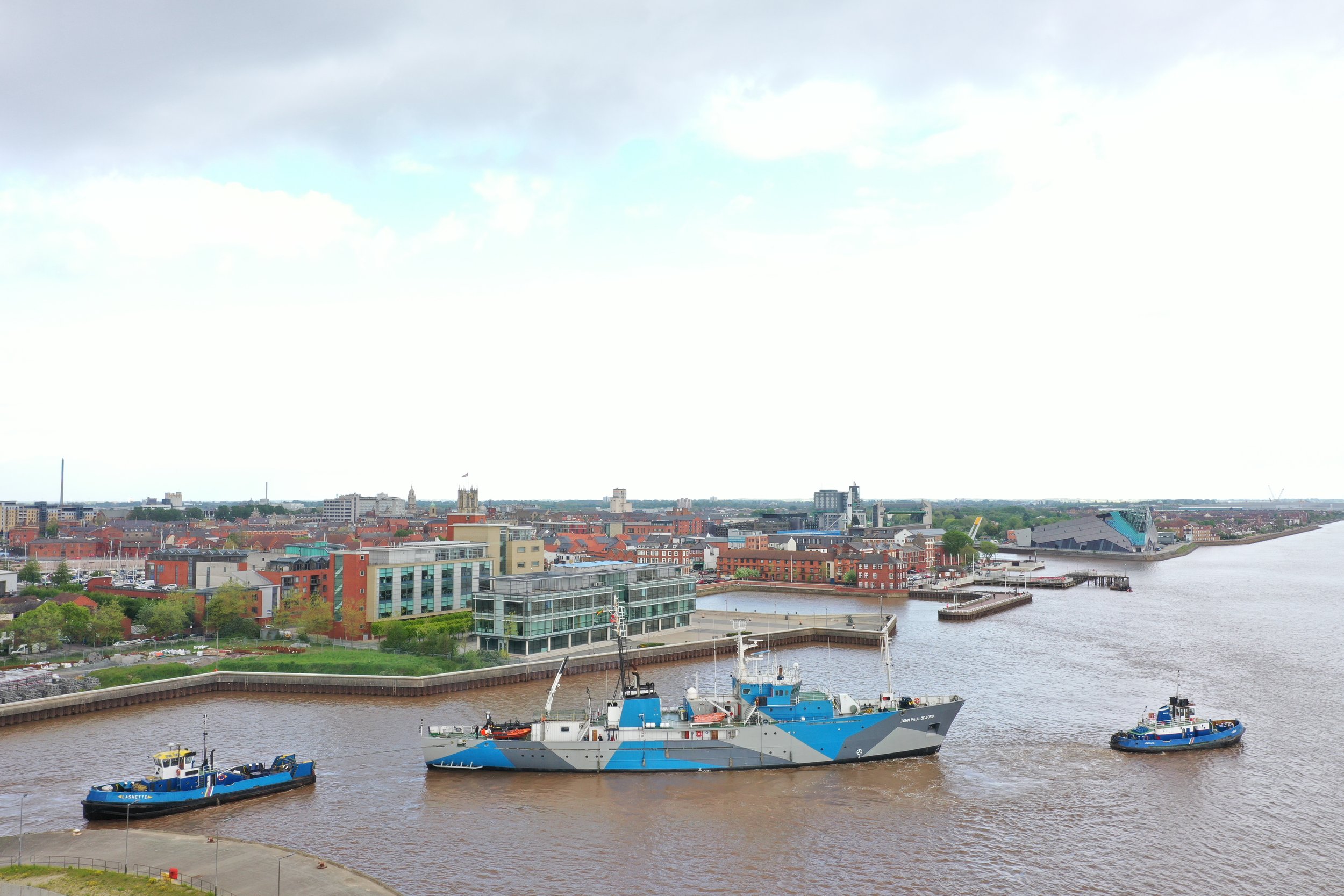‘We’ll do whatever’s necessary’: Life as an anti-whaler
PARTNERS: Locky Maclean, left, and Paul Watson. Pictures by JPD Media
Now & Then, a column by Angus Young
In discussion with Locky Maclean, captain of the John Paul Dejora
Back in 1978 a 27-year-old Canadian arrived in Hull with $120,000 in his pocket to buy a trawler.
The city’s deep water fishing industry had just collapsed following the Cod Wars but the owners of the recently-retired sidewinder trawler Westella wanted more than Paul Watson was offering.
“I said: ‘That’s all I have’ and they said: ‘OK’ so I had my first ship.”
The money had been given to him by Cleveland Amory, founder of the Fund for Animals and an early pioneer in animal rights activism in America. To carry out the necessary repairs required to make her seaworthy for a planned voyage to confront seal hunters, Watson secured a grant from the Royal Society for the Prevention of Cruelty of Animals.
They were unconventional times and Watson was certainly that. Shortly before his journey to Hull, he had quit Greenpeace. Having been an early member of the group, his outspoken criticism of its policy of non-violent campaigning led to him being voted off its board.
ON A MISSION: The John Paul Dejora
Now he was at the helm of his own ship, re-named Sea Shepherd. Within seven months he was ramming a whaling ship. The action led to the authorities in Portugal seizing his vessel. Undeterred, he scuttled it exactly a year to the day since its departure from Hull.
A controversial career as a self-styled “interventionist” has followed with his preference for direct action leading to him being branded an “eco terrorist” by the Japanese government.
Today a ship owned by the marine conservation foundation bearing his name is back in Hull after a trip to Iceland aimed at disrupting the activities of the country’s last remaining whaling company.
Locky Maclean, captain of the John Paul Dejora, seems happy with the trip.
“We left Hull in March for New York for a naming ceremony for the ship before heading onwards to the mission to Iceland. We didn’t realise it at the time but we were sailing into both a literal storm and a political storm,” he says.
DISRUPTER: An aerial shot of the John Paul Dejora
“We had just reached the Icelandic waters when we heard the Icelandic government had temporarily suspended the hunting of fin whales. The hunting season was just about to start and the suspension covered three months.
“When you consider a whaler can kill up to four fin whales a day, I think we got a good result without having to actually disrupt anything. As it was, the weather closed in and we had to abandon our original plan to follow the whalers up into the Northern Arctic.
“They go up there, charter Russian ice-breakers and literally cut their way through to get to Japan where there’s still a market for whale meat. It shows the lengths they go to to keep this trade going.”
A subsequent partial u-turn by the Icelandic government then shortened the suspension.
“Eventually, we needed to return to Hull but a couple of our team based in Iceland later managed to delay the start of operations by climbing the masts of two vessels and staying there for two days,” says Locky.
‘THEY CARE ABOUT WHAT WE’RE DOING’: A crew member fabricating a slingshot
“They were both very brave girls to do what they did in those conditions.”
Locky has worked with Paul Watson for 20 years. Originally from Vancouver Island, like his mentor he’s developed an affinity with Hull.
“Being here just seems right,” he says as we look out over Albert Dock sipping herbal tea on the bridge of what used to be a Scottish fisheries protection vessel.
He nods towards the Arctic Corsair, currently being restored by ship repair firm Dunston ahead of being re-berthed on the River Hull as a visitor attraction.
“Another sidewinder trawler, just like Paul’s first ship,” says Locky. “We are incredibly lucky because Dave Clark [technical and operations director at Dunston] knows this ship like the back of his hand because his company used to work on it when it was a fisheries vessel. Having a company like Dunston here is invaluable.”
‘SPECIAL PEOPLE’: A member of the John Paul Dejora’s crew readying the mooring lines
He shows me a narrow oblong hole cut into the side of the ship’s hull just above the waterline. Next to it is a small floating platform where pieces of steelwork are scattered about.
“See that hole? It’s the only way the lads from Dunston can get the old steel out of the ship and the new steel in. It’s supporting the sewage tank which hasn’t been moved for 40 years. Rather them than me!
“We’re also having an engine overhaul being carried out by Kingston Marine Services here in Hull. They’re a lovely family business who have a great team of engineers and one of the best workshops I’ve ever seen. It’s spotless.
“It’s always nice to work with businesses who take pride in their work and both Dunston and KWS fit into that category.
“We’re talking about a 40-year-old ship here so having people who know exactly what they are doing and are able to source the right parts if necessary is very important. I’m a big fan of good old-fashioned quality British manufacturing.”
TAKING ON THE WHALERS: The John Paul Dejora battling through heavy seas
At sea, the John Paul Dejora operates with a crew of 28. Most are volunteers and they come from around the world.
“The crew usually stays onboard between three and six months before changing over,” explains Locky. “On the last trip we had 13 nationalities.
“Being in port can be a bit boring for the crew - there’s always a lot of painting going on - but you just have to accept things like repairs and maintenance have to be done and it pays off in the end because you don’t want something going seriously wrong in the middle of the ocean.
“Our crews are special people because, first and foremost, they care about what we are doing. They wouldn’t be here otherwise.”
Once all the work is finished, the ship’s next mission is already mapped out.
IN GOOD HANDS: The John Paul Dejora arriving in Hull
“We are going after the really big super trawlers which basically eat up everything and then discharge an entire catch if the fish aren’t the right size. In doing so, they kill pretty much everything - it’s a 100 per cent mortality rate.
“Last year around 100,000 dead fish were recorded in the Bay of Biscay having been reportedly discarded by the trawler Margiris. That’s what we are up against.
“Never mind fishing quotas, some of these trawlers can destroy an entire’s country’s quota just like that.
“At sea it’s still very much like the Wild West despite all the regulations and directives. No-one really knows what goes on so it’s our job to make sure people are more aware and if that means direct action then so be it. We will do whatever is necessary to highlight it.”








